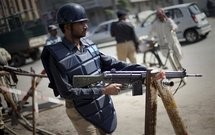 Considering that Pakistan over the past decade has become the global center of transnational jihadism, the Southwest Asian nation's move to craft its first-ever national counterterrorism policy is a major development. Having lost some 50,000 citizens over the course of a seven-year jihadist insurgency, the country, led by recently elected Prime Minister Nawaz Sharif, is under immense pressure to head off violent extremism before the withdrawal of Western forces from neighboring Afghanistan further aggravates the situation. The incipient policy will be difficult to implement because of the government's limited capabilities and Pakistan's social and political environment.
Considering that Pakistan over the past decade has become the global center of transnational jihadism, the Southwest Asian nation's move to craft its first-ever national counterterrorism policy is a major development. Having lost some 50,000 citizens over the course of a seven-year jihadist insurgency, the country, led by recently elected Prime Minister Nawaz Sharif, is under immense pressure to head off violent extremism before the withdrawal of Western forces from neighboring Afghanistan further aggravates the situation. The incipient policy will be difficult to implement because of the government's limited capabilities and Pakistan's social and political environment.
Pakistani Interior Minister Chaudhry Nisar Ali Khan on Tuesday unveiled the proposed National Counterterrorism and Extremism Policy 2013 in parliament. The policy seeks to combat terrorism through sweeping reforms to education, law enforcement, the judiciary and foreign policy. It is unclear how long it will take to approve the measure, but as the minister's remarks showed, the situation in Pakistan is quite serious. Militants are far ahead of law enforcement agencies in organization and technology, Khan said, adding that the country's enemies "don't have to do anything," because the country is falling apart on its own.
The move to create what is being described as a comprehensive national security policy is long overdue. For the past couple of years, Pakistan's army chief and even the head of the premier intelligence service, the Inter-Services Intelligence directorate, have said that the threat to the country is not external (a reference to Pakistan's principal rival, India) but rather internal. These statements mark a historic shift in attitude. It has also been more than four years since Islamabad launched a major counterinsurgency offensive against Taliban rebels in the greater Swat region and the tribal badlands along the border with Afghanistan.
That offensive, which remains a work in progress, has provided the country with some respite. But the reactive nature of the campaign meant that it could go only do so much to neutralize the threat. Even as Islamabad tries to take a proactive approach, it faces immense challenges, two of which stand out.
The first challenge is the lack of a national consensus on how best to tackle the jihadist threat. Many are calling for negotiations with the jihadist rebels, while others want the government to go on the offensive. Islamist militants have long exploited this ambivalence in their efforts to further weaken the state.
Second and more important is the fact that Islamabad for decades has been a state sponsor of Islamist militant proxies as part of its security doctrine with regard to India. An internationally backed Islamist insurgency against Soviet forces during the 1980s in Afghanistan took this strategy to a whole new level, and the relationship continued unencumbered until the 9/11 attacks. The U.S. response to 9/11 -- to undertake an international war against radical Islamism -- involved the application of extensive pressure on Islamabad to cooperate, leading Pakistan to gradually lose control over its former assets.
As a result, an alliance of several domestic and foreign jihadist forces turned their guns against Islamabad. The situation has reached the point that Pakistan's influence over militant groups that are not hostile toward it has waned. Radical Islamist forces of various stripes have overwhelmed Islamabad because they have not only penetrated the state -- especially its security apparatus -- but they are also deeply embedded within the country's social fabric. Displacing these elements will require a multigenerational process of societal transformation. Such an undertaking demands a new national narrative and not simply a counterterrorism policy.
Courtesy : Stratfor (www.stratfor.com)